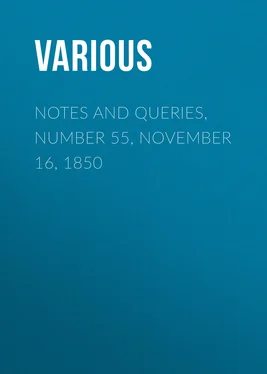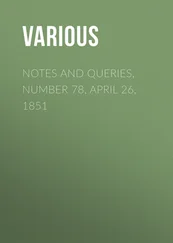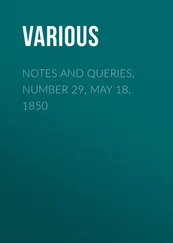Various - Notes and Queries, Number 55, November 16, 1850
Здесь есть возможность читать онлайн «Various - Notes and Queries, Number 55, November 16, 1850» — ознакомительный отрывок электронной книги совершенно бесплатно, а после прочтения отрывка купить полную версию. В некоторых случаях можно слушать аудио, скачать через торрент в формате fb2 и присутствует краткое содержание. Жанр: foreign_antique, periodic, foreign_edu, на английском языке. Описание произведения, (предисловие) а так же отзывы посетителей доступны на портале библиотеки ЛибКат.
- Название:Notes and Queries, Number 55, November 16, 1850
- Автор:
- Жанр:
- Год:неизвестен
- ISBN:нет данных
- Рейтинг книги:4 / 5. Голосов: 1
-
Избранное:Добавить в избранное
- Отзывы:
-
Ваша оценка:
- 80
- 1
- 2
- 3
- 4
- 5
Notes and Queries, Number 55, November 16, 1850: краткое содержание, описание и аннотация
Предлагаем к чтению аннотацию, описание, краткое содержание или предисловие (зависит от того, что написал сам автор книги «Notes and Queries, Number 55, November 16, 1850»). Если вы не нашли необходимую информацию о книге — напишите в комментариях, мы постараемся отыскать её.
Notes and Queries, Number 55, November 16, 1850 — читать онлайн ознакомительный отрывок
Ниже представлен текст книги, разбитый по страницам. Система сохранения места последней прочитанной страницы, позволяет с удобством читать онлайн бесплатно книгу «Notes and Queries, Number 55, November 16, 1850», без необходимости каждый раз заново искать на чём Вы остановились. Поставьте закладку, и сможете в любой момент перейти на страницу, на которой закончили чтение.
Интервал:
Закладка:
It is a branch of the subject which I have not yet fully considered; but MR. SPEDDING will observe that the view I take does not interfere with the supposition that Fletcher revised the play, with additions for its revival in 1613; a task for the performance of which he would probably have the consent of his early master.
SAMUEL HICKSON.ON AUTHORS AND BOOKS, NO. IX
Eustache Deschamps. Except in the two centuries next after the conquest, contemporaneous French notices of early English writers seem to be of rather infrequent occurrence.
On this account, and on other accounts, the ballad addressed to Geoffrey Chaucer by Eustache Deschamps deserves repetition. Its text requires to be established, in order that we may be aware of its real obscurities—for no future memoir of Chaucer can be considered as complete, without some reference to it.
The best authorities on Eustache Deschamps are MM. Crapelet, Raynouard, and Paulin Paris. To M. Crapelet we are indebted for the publication of Poésies morales et historiques d'Eustache Deschamps ; to M. Raynouard, for an able review of the volume in the Journal des Savants ; and to M. Paulin Paris, for an account of the manuscript in which the numerous productions of the author are preserved. Of the author himself, the learned M. Paris thus writes:—
"On pourroit surnommer Eustache Deschamps le Rutebeuf du XIV esiècle.—Ses oeuvres comprennent des épitres, des discours en prose, des jeux dramatiques, des ouvrages latins, des apologues, un grand poème moral, et un infinité de ballades et rondeaux pieux, bouffons, satiriques," &c.
Two impressions of the ballad in question are before me; one, in the Life of Geoffrey Chaucer by sir Harris Nicholas , dated 1843—and the other in a volume entitled Geoffrey Chaucer, poète anglais du XIV esiècle. Analyses et Fragments par H. Gomont , Paris, 1847.—I transcribe the ballad from the latter volume, as less accessible to English students:—
O Socrates, plains de philosophie,
Senèque en meurs et Anglais en pratique,
Ouï des grans en ta poëterie,
Bries en parler, saiges en rethorique,
Virgiles tres haulz qui, par ta théorique,
Enlumines le règne d'Eneas,
Lisle aux geans, ceuls du Bruth, et qui as
Semé les fleurs et planté le rosier,
Aux ignorants, de la langue pandras
Grant translateur, noble Geffroy Chaucier.
Tu es d'amours mondains Dieux en Albie,
Et de la rose en la terre angélique,
Qui d'Angela Saxonne et (est) puis flourie
Angleterre (d'elle ce nom s'applique).
Le derrenier en l'éthimologique
En bon anglès le livre translatas;
Et un Vergier, où du plant demandas
De ceuls qui sont pour eulx auctorisier,
A ja long teams que tu édifias,
Grant tranlslateur noble Geffroy Chaucier.
A toy, pour ce, de la fontaine Helye
Requier avoir un buvraige autentique
Dont la doys est du tout en ta baillie,
Pour rafrener d'elle ma soif éthique
Qui men gaule seray paralitique
Jusques à ce que tu m'abuveras.
Eustaces sui qui de mon plant aras;
Mais pran en gre les euvres d'escolier
Que par Clifford de moy Bavoir pourras,
Grant translateur noble Geffroy Chaucier.
Poëte hauls loenge destynie
En ton jardin ne seroie qu'ortie
Considere ce que j'ai dit premier
Ton noble plant, ta douce melodie
Mais pour savoir de rescripre te prie,
Grant translateur noble Geoffroy Chaucier."
The new readings are in Italics, and I shall now repeat them with the corresponding words as printed by sir Harris Nicolas:—
"Anglais=angles; Ouï des grans=Ovides grans; Virgiles=Aigles; d'Angela=dangels; sont=font; A ja=N'a pas; buvraige=ouvrage; rafrener=rafrecir; soif=soix; Qui men=Qu'en ma; En=Et."
After such an exhibition of various readings, arising out of only two copies of the same manuscript, it is evident that a re-collation of it is very desirable, and I am sure the result would be thankfully received by the numerous admirers of Chaucer.
BOLTON CORNEY.Eustache Deschamps (Vol. ii., p. 376.).—J.M.B. is desirous of learning some particulars of this French poet, contemporaneous with Chaucer. He will find a brief notice of him in the Recueil de Chants Historiques Français, depuis le XIIème jusqu'au XVIIIème Siècle , by Le Roux de Lincy (2 vols. Paris, 1841, Libraire de Charles Espelin). He is there described as,
"Ecuyer et huissier d'armes des rois Charles V. et Charles VI., qui resta toujours fidèle à la maison de France;"
And the editor adds:
"Les œuvres d'Eustache Deschamps contiennent pour l'histoire du XIVème siècle des renseignemens précieux; on peut y recueillir des faits politiques qui ne sont pas sans importance, mais on y trouve en plus grand nombre des détails précieux sur les mœurs, les usages, et les coutumes de cette époque."
His poems were published for the first time in one vol. 8vo., in 1832, by M. Crapelet, with this title:
"Poésies morales et historiques d'Eustache Deschamps, écuyer, huissier d'armes des rois Charles V. et Charles VI., chatelain de Fismes et bailli de Senlis."
As regards the " genuineness " of the poem cited, I am inclined, with J.M.B., to think that it admits of question, the orthography savouring more of the end of the fifteenth than of the close of the fourteenth century. I am sorry not to be able to explain the meaning of " la langue Pandras ."
D.C.NOTES ON THE SECOND EDITION OF MR. CUNNINGHAM'S HANDBOOK OF LONDON
21. New Tunbridge Wells, at Islington. —This fashionable morning lounge of the nobility and gentry during the early part of the eighteenth century, is omitted by Mr. Cunningham. There is a capital view of it in Bickham's Musical Entertainer , 1737:
"These once beautiful tea-gardens (we remember them as such) were formerly in high repute. In 1733 their Royal Highnesses the Princesses Amelia and Caroline frequented them in the summer time for the purpose of drinking the waters. They have furnished a subject for pamphlets, poems, plays, songs, and medical treatises, by Ned Ward, George Colman the older, Bickham, Dr. Hugh Smith, &c. Nothing now remains of them but the original chalybeate spring, which is still preserved in an obscure nook, amidst a poverty-stricken and squalid rookery of misery and vice."—George Daniel's Merrie England in the Olden Time , vol. i. p. 31.
22. London Spa (from which Spa Fields derives its name) dates as far back as 1206. In the eighteenth century, it was a celebrated place of amusement. There is a curious view of "London Spaw" in a rare pamphlet entitled May-Day, or, The Original of Garlands . Printed for J. Roberts, 1720, 8vo.
23. Spring Gardens. —Cox's Museum is described in the printed catalogue of 1774, as being in "Spring Gardens." In the same year a small volume was published containing A Collection of various Extracts in Prose and Verse relative to Cox's Museum .
24. The Pantheon in Spa Fields. —This place of amusement was opened in 1770 for the sale of tea, coffee, wine, punch, &c. It had an organ, and a spacious promenade and galleries. In 1780 it was converted into a lay-chapel by the Countess of Huntingdon, and is now known as Northampton or Spa Fields Chapel . Mr. Cunningham speaks of the burying-ground (originally the garden), but singularly enough omits to notice the chapel.
Читать дальшеИнтервал:
Закладка:
Похожие книги на «Notes and Queries, Number 55, November 16, 1850»
Представляем Вашему вниманию похожие книги на «Notes and Queries, Number 55, November 16, 1850» списком для выбора. Мы отобрали схожую по названию и смыслу литературу в надежде предоставить читателям больше вариантов отыскать новые, интересные, ещё непрочитанные произведения.
Обсуждение, отзывы о книге «Notes and Queries, Number 55, November 16, 1850» и просто собственные мнения читателей. Оставьте ваши комментарии, напишите, что Вы думаете о произведении, его смысле или главных героях. Укажите что конкретно понравилось, а что нет, и почему Вы так считаете.












